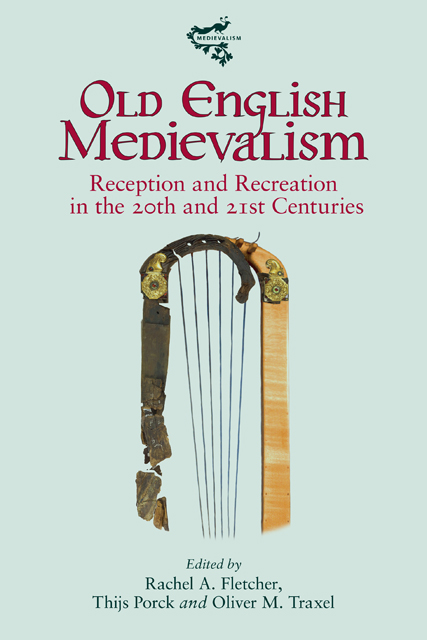Book contents
- Frontmatter
- Contents
- List of Illustrations
- List of Contributors
- Acknowledgements
- List of Abbreviations
- Early Medieval English in the Modern Age: An Introduction to Old English Medievalism
- I Reinventing, Reimagining and Recontextualizing Old English Poetry
- II Invoking Early Medieval England and Its Language in Historical Fiction
- III Translating and Composing in Neo-Old English
- IV Approaching Old English and Neo-Old English in the Classroom
- Bibliography
- Index
- Medievalism
Early Medieval English in the Modern Age: An Introduction to Old English Medievalism
Published online by Cambridge University Press: 17 December 2022
- Frontmatter
- Contents
- List of Illustrations
- List of Contributors
- Acknowledgements
- List of Abbreviations
- Early Medieval English in the Modern Age: An Introduction to Old English Medievalism
- I Reinventing, Reimagining and Recontextualizing Old English Poetry
- II Invoking Early Medieval England and Its Language in Historical Fiction
- III Translating and Composing in Neo-Old English
- IV Approaching Old English and Neo-Old English in the Classroom
- Bibliography
- Index
- Medievalism
Summary
Old english is alive! While the last native speaker of Old English may have died over 900 years ago, the language of early medieval England seems more popular than ever. In recent decades, modern poets, authors of historical fiction and production teams of TV series, movies and video games have drawn on the language and literature of early medieval England for inspiration. The presence of early medieval English in the modern age is hard to miss: Seamus Heaney’s 1999 Beowulf translation was a world-wide best seller and Paul Kingsnorth’s Man Booker Prize-longlisted novel The Wake (2014) was completely written in ‘pseudo-Old English’, while immensely popular media set in Viking Age England, such as the TV series Vikings (2013–20) and the video game Assassin’s Creed: Valhalla (2020), feature dialogue in Old English. These more recent revivals of Old English are part of a long trend that goes as far back as the Middle Ages; Old English language and literature have long been a source of artistic inspiration and fascination, providing scholars and artists with the opportunity not only to explore the past but, in doing so, to find new perspectives on the present.
This volume explores how Old English has been transplanted and recreated in the twentieth and twenty-first centuries by translators, novelists, poets and educators. As the individual chapters demonstrate, these Old English afterlives take on various forms, ranging from the evocation of elements of Old English language or style in the context of a modern literary work to the adaptation and recontextualisation of works of Old English literature, the depiction of Old English-speaking worlds and world views in historical fiction, and even linguistic recreation through the composition of neo-Old English (whether translating an existing text into Old English or creating an original work). The contributors to this collection investigate a myriad of literary, political and ideological uses of Old English in the modern world, as well as addressing concerns about the linguistic and cultural authenticity of these various modes of recreation. For several of them, these concerns are not only theoretical but personal, as the volume includes contributions from practicing writers and translators.
- Type
- Chapter
- Information
- Old English MedievalismReception and Recreation in the 20th and 21st Centuries, pp. 1 - 16Publisher: Boydell & BrewerPrint publication year: 2022



